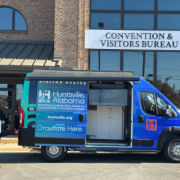American Exchange Project explores partnership in Huntsville for civic exchange program
Today, fewer than 4% of new marriages are between Democrats and Republicans.
This was just one data point shared by David McCullough III when he spoke to The Huntsville Rotary Club on September 16 about the urgent need for civic education and domestic cultural exchange.
McCullough, who happens to be the grandson of the late historian David McCullough, co-founded the American Exchange Project (AEP) in 2019 as a way to address deepening partisanship across the nation.
McCullough opened his remarks by sharing the story of Paul Harris, who founded Rotary in Chicago in 1905. Within six years, 16 Rotary chapters dotted the United States. In the club’s periodical, The National Rotarian, Harris wrote that if he could say just one word to every Rotarian it would be “toleration.”
“Toleration, tolerance, gives us connection. Connection gives us community. And I think community is ultimately what is relied upon from that fundamental human quality, which is to be curious,” said McCullough. “My grandfather said, ‘Our curiosity is what separates us from the cabbages.’ I totally agree.”
We find ourselves in a troubling moment, marred by division and misunderstanding. The young people of America are being raised in ever more cloistered socioeconomic, racial, and ideological bubbles. And they know it.
“As we started to talk to more and more teenagers, we realized that all over the country—whether we were in Cotulla, Texas; Pine Ridge, South Dakota; or Boston, Massachusetts—kids were complaining about a different version of the same thing,” said McCullough. “‘I feel like I’m growing up in a bubble, and I’ve never seen life outside the bubble.’”
The American Exchange Project applies the idea of an international “study abroad” program to the needs that exist within our own nation to break through these bubbles of homogeneity.
Since its inception, 1,500 students have participated in the American Exchange Project, which is a free, first-of-its-kind domestic intercultural program. The program matches graduating high school students with communities around the country. The only requirement being that they travel to a destination markedly different from where they call home. Students spend one week in the new community, before returning to act as tour guides for students who will be “studying abroad” in their hometown.
“The data that has come back from the surveys we’ve taken on the students has been very encouraging,” said McCullough. “We’ve seen bias toward people who disagree with them go down significantly. We’ve seen faith in their fellow Americans go up significantly. We see an average of three new friends that weren’t there before the trip started.”
The friendships made during the program seem to be enduring. McCullough told the story of a young man named Andrew who grew up in a neighborhood in Connecticut where he was not safe to explore. Andrew was so nervous about his first airline flight that AEP provided a staff person to accompany him to his exchange program in Kilgore, Texas.
In Kilgore, Andrew had the experience of working on a ranch for a day. Having never encountered an animal larger than a dog, Andrew was startled by the size of the horses on the ranch. But Reece Nichols, owner of the 5 Cent Cattle Ranch, patiently encouraged Andrew until he worked up the courage to pet a horse. By the end of the day, Andrew felt like one of the ranchers.
Eight months after returning home from his exchange program, Andrew experienced serious health challenges that landed him in the hospital for an extended period. He found strength through his daily phone calls with Reece.
“I often imagine where we would be if every Andrew had a Reece, and every Reece had an Andrew,” said McCullough.
McCullough, who calls AEP a “civic moonshot,” would like to see one million students per year participate in the program. The benefits, he believes, would strengthen individuals, communities, and the very foundations of American democracy.
“Not only am I wary that today’s conflicts will not just shape the perspectives of young people on democracy, … I believe it’s going to take away a version of innocence that allows us to connect with people who are different from us and allows us to lean into curiosity and not fear,” said McCullough.
AEP is currently in 40 states in the nation but is not yet found in Alabama.
Could Huntsville be the city that brings this opportunity to Alabama?















